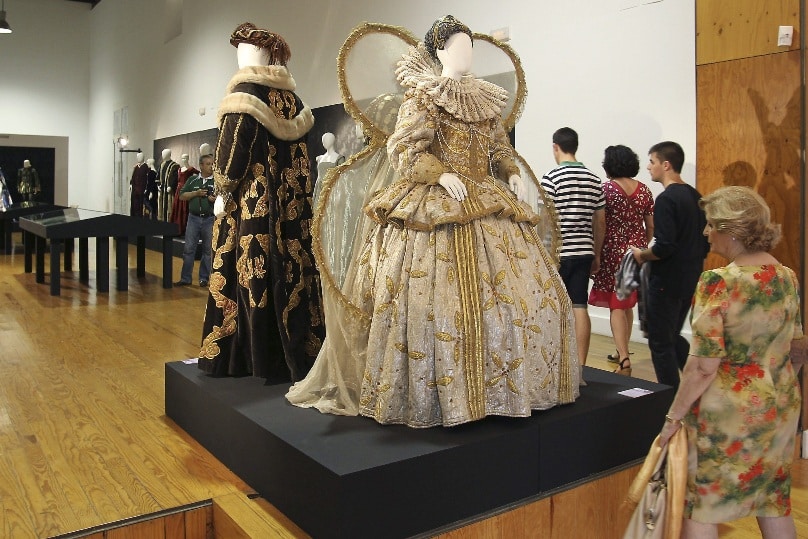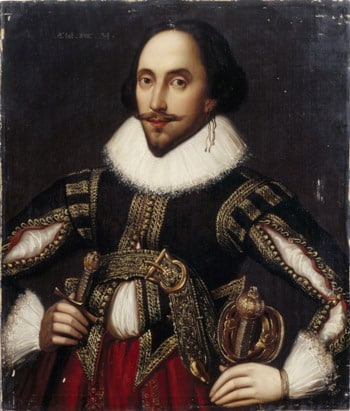
Throughout 2016, there have been worldwide celebrations and various special performances of Shakespeare’s plays all marking 400 years since “The Bard” died in April 1616. Perhaps most prominently in Australia, a special Shakespeare Edition of Q&A was held in early September in which several panelists including John Bell, Germaine Greer, and Kate Mulvaney and others discussed Shakespearean themes, inspirations and achievements of the past 400 years.
While this special Shakespearean Q&A rightly discussed several different themes of Shakespeare’s plays and particularly those which addressed his distinctively ‘humanitarian’ and ‘modern’ approach to different groups discriminated against within Elizabethan society – women, refugees, Jews, those of dark skin – there was a quite distinctive absence of any discussion of perhaps the largest and most persecuted ‘minority’ group during Shakespeare’s own time – Catholics.
This absence is particularly notable because there is much scholarship to suggest that Shakespeare was himself a secret Catholic.
In documented terms, one of the oldest references to Shakespeare’s Catholicism is some 70 years after his death in 1616 when an Anglican Archdeacon Richard Davies declared in relation to Shakespeare – “he dyed a Papyst”. By this time Shakespeare was already highly regarded and as current Shakespeare scholar Joseph Pearce argues in his book The Quest for Shakespeare, there was little or no motivation for Davies to suggest a connection between Shakespeare and Catholicism if this connection was fabricated. In fact as Davies was a “zealous Anglican” the opposite was probably the case. Davies’ comment of local legend is of course not conclusive in its own right but at the same time should not be discounted out of hand.
There are other connections.
In 1757 during the renovation of a house in which Shakespeare had been born, a documented will was found evidently written by John Shakespeare (the playwright’s father) which adopted a distinctively Catholic form demonstrating as Joseph Pearce argues “John Shakespeare’s Catholic bona fides and itemises his earnest desire to die a Catholic”.

Renowned Shakespeare scholar Stephen Greenblatt in his landmark book Hamlet in Purgatory (which delves into the fascinating question of the Ghost of Hamlet’s father and the Ghost’s connections to post-Reformation beliefs in Purgatory) quite masterfully relates the Ghost of Old Hamlet to the discovery of John Shakespeare’s will.
“There is a clear implication to be drawn from this document: the playwright was probably brought up in a Roman Catholic household in a time of official suspicion and persecution of recusancy.
And there is for our purposes, a further implication, particularly if we take seriously the evidence that Shakespeare conformed to the Church of England: in 1601 the Protestant playwright was haunted by the spirit of his Catholic father pleading for suffrages to relieve his soul from the pains of Purgatory.”
Greenblatt is one of the world’s most respected contemporary Shakespeare scholars, the editor of the Norton Shakespeare, a Pulitzer Prize winning author and a humanities professor at Harvard.
His extraordinary book traverses a journey of literary criticism which firstly contextualises English pre-Reformation beliefs, practices (and abuses) relating to Purgatory, before establishing the likely residual appreciation and nostalgia for the old religion amongst Shakespeare’s audiences which provides a cultural, religious and theatrical backdrop for the arrival of the Ghost of Old Hamlet.
In Elizabethan Protestant England, this was potentially controversial territory for Shakespeare but the master playwright had the “remarkable gift of knowing exactly how far he could go without getting into serious trouble [and thus] still only uses a network of allusions: “for a certain term”, “burned and purged away”, “Yes by Saint Patrick,” “hic et ubique.”
Perhaps to demonstrate that his book is neither a work of religious partisanship nor that Greenblatt is personally sympathetic to Catholicism, Greenblatt spends more than half of his Prologue to Hamlet in Purgatory reflecting on his own Jewish (but personally non religious) background before going to relate a family story of Jewish kaddish prayers for the dead which he came to conclude was his father’s desire for him to pray for him following his passing.
“This practice then, which with a lightly ironic piety I, who scarcely know how to pray, undertook for my own father, is the personal starting point for what follows.”
Greenblatt’s book is a very literary discussion of often quite religious issues but without ever saying it directly in Hamlet in Purgatory, the reader can nevertheless be naturally drawn to the conclusion that Greenblatt seems very open to the possibility that Shakespeare was himself a Catholic.
This position is not unanimous however and Diarmaid Macculoch, a lecturer on church history at Oxford pointed this out when interviewed by Catholic News Service (CNS) highlighting, amongst other things, that when Shakespeare quoted the Bible, he used official Protestant translations.
“Of course, there was some nostalgia for the old religion, and it’s natural Catholics should claim this great cultural icon for themselves.”
“But Shakespeare’s Catholic family associations prove nothing about his own outlook. It’s wrong to assume his work reflects some popular groundswell in favor of Catholicism,” Macculoch told CNS.
The suggestion that only Catholics have tended to be interested in this question, however, has always been and remains incorrect. From Rev Davies, a 17th century Anglican cleric, to Greenblatt today, this is an issue which has deeply fascinated scholars and commentators from across the spectrum.
Earlier this week, Joseph Pearce spoke to The Catholic Weekly pointing out that: “Non-Catholics who have done ground-breaking research into Shakespeare’s Catholicism include the following: John Henry de Groot in The Shakespeares and ‘The Old Faith; E. A. Honigmann in Shakespeare: The ‘Lost Years’; Richard Wilson in Secret Shakespeare and Michael Wood in Shakespeare.”
This is not to say that every Shakespeare scholar necessarily asserts that Shakespeare was a religious, practising Catholic but a significant number of scholars from various different backgrounds have come to the view that Shakespeare grew up a Catholic and was at least sympathetic to the Catholic Faith even if he was not personally a regular worshipper. Macculoch even admits as much when he speaks of “Shakespeare’s Catholic family associations”.
Others go further and assert that there are numerous sympathetic portrayals of Catholic themes, characters and, even, places within Shakespeare’s plays including Purgatory which is obviously referenced by the Ghost in Hamlet, positive portrayals of priests in both Romeo and Juliet and Much Ado About Nothing and of Catholic characters in other plays which is argued by Clare Asquith in her book Shadowplay: the Hidden Beliefs and Coded Politics of William Shakespeare as well as the fact that several of Shakespeare’s comedies take place in Catholic Italy as was pointed out by renowned Shakespeare scholar Fr Peter Milward SJ.
As Stephen Greenblatt suggests, “We do not, however, need to believe that Shakespeare was himself a secret Catholic sympathiser, we need only to recognise how alert he was to the materials that were being made available to him.”
As Shakespeare’s 400th anniversary year comes to its conclusion – for a brief moment – perhaps we might consider leaving aside arguments over whether Shakespeare was a himself a practising Catholic, which everyone agrees in any case is hard to prove definitively, as any Catholicism at the time was practised in the utmost secrecy. Instead perhaps we can reflect more broadly on what is now quite widespread agreement amongst scholars that Shakespeare was brought up in a Catholic family, and that the family in general had recusant sympathies.
Maybe the real question is, did Shakespeare’s Catholic upbringing in any way inform his writing? With this in mind, it might be worth going back and re-reading your Shakespeare Anthology or going to see his plays again on stage. Luckily, his most famous play happens to be playing in Sydney again later this month.
Artes Christi will stage Shakespeare’s Hamlet, produced by Anthony McCarthy, at the Seymour Centre from 14-15 October. Tickets from $35 ($30 concession). Family and group discounts also available. Book online at theword.org.au.
Win a double pass to see Hamlet
The Catholic Weekly, in partnership with Artes Christi, is offering readers the chance to win one of 10 double passes toThe Tragedy of HAMLET, Prince of Denmark. The lucky winners will attend the 2pm matinee performance at the Seymour Centre on Saturday, October 15, starring Andrew Cougle as Hamlet. To enter phone (02) 9390 5413 and leave a message with your name and phone number, or email your details to [email protected]. Entries close 5pm, Friday, 7 October. Winners will be drawn on Monday, 10 October and can collect double passes (valued at $70 each) from the box office.
Related: Artes Christi to bring Shakespeare’s Hamlet to the stage next month
